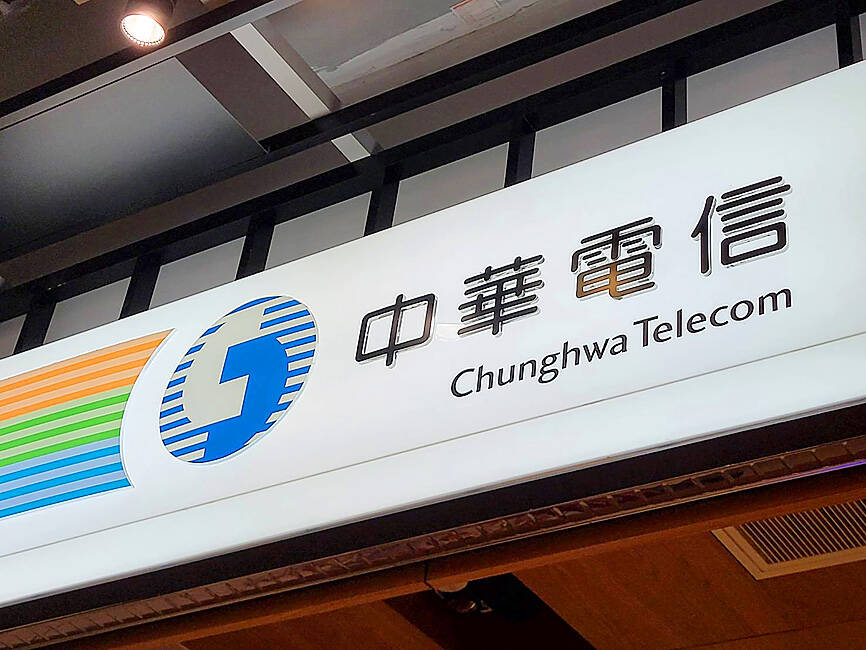Chunghwa Telecom Co (中華電信), the nation’s biggest telecom, yesterday said it plans to invest more than NT$4.6 billion (US$139.2 million) in a new trans-Pacific fiber-optic submarine cable with global partners, with an aim to boost network resilience and to cope with rising demand from artificial intelligence (AI) applications.
The telecom’s new investment came amid caution over submarine cable security after several cables linked to Taiwan have been sabotaged by foreign freighters or natural causes since the beginning of this year.
The new subsea cable network, dubbed E2A, is to be developed and invested by a consortium that comprises Chunghwa Telecom, SK Broadband Co, Softbank Corp and Verizon Business Global LLC, Chunghwa Telecom said in a statement.

Photo: CNA
The E2A, spanning 12,500km, would significantly enhance digital connectivity between Asia and North America, providing a robust backbone for AI applications, data centers and cloud services, ensuring high-speed connectivity across the Pacific Ocean as well as intra-Asia, the statement said.
The new submarine cable is scheduled to be ready for service in the second half of 2028, the statement said.
“Chunghwa Telecom will continue to enhance its resilient network infrastructure by integrating submarine cables, fiber optics, mobile communications, satellites and microwave technologies — forming a comprehensive ‘Sea, Land, Sky, and Space’ network,” Chunghwa Telecom chairman Alex Chien (簡志誠) said in the statement.
“Leveraging Taiwan’s strategic position as an Asia-Pacific information hub, we aim to attract international operators to establish a presence in Taiwan, further advancing AI-driven innovations and co-creation services to meet the evolving needs of our customers,” he said.
Crossing the Pacific Ocean, the E2A cable system would connect major digital hubs in Asia and North America, with landings in Yilan County’s Toucheng Township (頭城), South Korea’s Busan, Japan’s Chiba and Morro Bay in California, the statement said.
The cable would also connect with other upcoming cables in Taiwan, such as the SJC2 and Apricot, enabling diverse connectivity options, Chunghwa Telecom said.
This would strengthen Taiwan’s position as a key submarine cable hub in the Asia-Pacific region, it said.
It would further enhance the company’s overall network resilience, in addition to providing sufficient bandwidth to meet demand, it added.
The total cost of the submarine cable would be shared by all parties of the consortium, Chunghwa Telecom said.
The company has so far invested in more than 30 global submarine cables, with about 14 of them landing in Taiwan, it said.
The company has budgeted NT$32.36 billion for capital expenditure this year, up 12.3 percent from NT$28.82 billion last year.
Non-mobile capital expenditure is to increase 25.2 percent to NT$23.98 billion this year as Chunghwa Telecom aims to fund its investments in AI, data centers and new submarine cables, it added.

INVESTIGATION: The case is the latest instance of a DPP figure being implicated in an espionage network accused of allegedly leaking information to Chinese intelligence Democratic Progressive Party (DPP) member Ho Jen-chieh (何仁傑) was detained and held incommunicado yesterday on suspicion of spying for China during his tenure as assistant to then-minister of foreign affairs Joseph Wu (吳釗燮). The Taipei District Prosecutors’ Office said Ho was implicated during its investigation into alleged spying activities by former Presidential Office consultant Wu Shang-yu (吳尚雨). Prosecutors said there is reason to believe Ho breached the National Security Act (國家安全法) by leaking classified Ministry of Foreign Affairs information to Chinese intelligence. Following interrogation, prosecutors petitioned the Taipei District Court to detain Ho, citing concerns over potential collusion or tampering of evidence. The

NEGOTIATIONS: The US response to the countermeasures and plans Taiwan presented has been positive, including boosting procurement and investment, the president said Taiwan is included in the first group for trade negotiations with the US, President William Lai (賴清德) said yesterday, as he seeks to shield Taiwanese exporters from a 32 percent tariff. In Washington, US Trade Representative Jamieson Greer said in an interview on Fox News on Thursday that he would speak to his Taiwanese and Israeli counterparts yesterday about tariffs after holding a long discussion with the Vietnamese earlier. US President Donald Trump on Wednesday postponed punishing levies on multiple trade partners, including Taiwan, for three months after trillions of US dollars were wiped off global markets. He has maintained a 10 percent

TRADE: The premier pledged safeguards on ‘Made in Taiwan’ labeling, anti-dumping measures and stricter export controls to strengthen its position in trade talks Products labeled “made in Taiwan” must be genuinely made in Taiwan, Premier Cho Jung-tai (卓榮泰) said yesterday, vowing to enforce strict safeguards against “origin laundering” and initiate anti-dumping investigations to prevent China dumping its products in Taiwan. Cho made the remarks in a discussion session with representatives from industries in Kaohsiung. In response to the US government’s recent announcement of “reciprocal” tariffs on its trading partners, President William Lai (賴清德) and Cho last week began a series of consultations with industry leaders nationwide to gather feedback and address concerns. Taiwanese and US officials held a videoconference on Friday evening to discuss the

PERSONAL DATA: The implicated KMT members allegedly compiled their petitions by copying names from party lists without the consent of the people concerned Judicial authorities searched six locations yesterday and questioned six people, including one elderly Chinese Nationalist Party (KMT) member and five KMT Youth League associates, about alleged signature forgery and fraud relating to their recall efforts against two Democratic Progressive Party (DPP) legislators. After launching a probe into alleged signature forgery and related fraud in the KMT’s recall effort, prosecutors received a number of complaints, including about one petition that had 1,748 signatures of voters whose family members said they had already passed away, and also voters who said they did not approve the use of their name, Taipei Deputy Chief Prosecutor